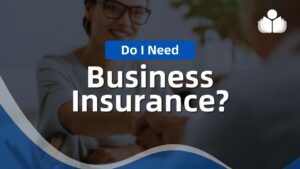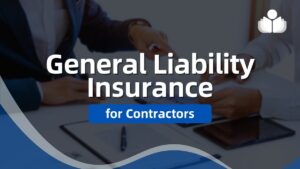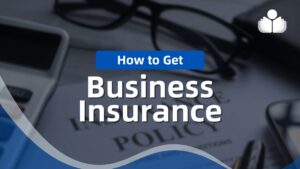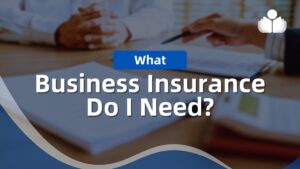Business insurance costs can vary widely. For example, shoppers who buy general liability insurance from NEXT pay an average of $11 per month, while those purchasing from The Hartford pay an average of $67 per month.
Why such a big difference? Multiple factors affect the cost of business insurance, such as the specific policies you need, the coverage those policies include, and the nature of your business. The more coverage you need, the higher your costs will be. The best way to estimate your company’s insurance expenses is to obtain quotes from multiple providers.
>> Secure Your Future – Get Covered With Next! >>
What Is the Average Cost of Small Business Insurance?
General liability insurance is the first policy that most small business owners need, and also the least expensive. According to an analysis of 30,000 small businesses that purchased commercial insurance through Insureon, the average cost of a general liability policy is $42 per month or $500 per year.
General liability coverage is often bundled with commercial property insurance at a discount in a package called a Business Owner’s Policy (BOP). Many small business owners opt for a BOP because it protects their bottom line from damage or loss to their business property. The average cost of a BOP is $57 per month or $684 annually.
How Is Small Business Insurance Cost Determined By Insurers?
Small business insurance companies consider several factors when determining your premium, including:
- The value of your business property
- Business revenue
- How many people are employed by the business?
- The age and size of your business
- The type of business
- The types of coverage
- Your claims history
>> Explore NEXT for Comprehensive Coverage >>
How to Lower Small Business Insurance Costs
Business insurance is crucial for protecting a company from costly damages, but it can be a significant expense, especially for small businesses. Purchasing a Business Owner’s Policy (BOP) is an effective way to save.
A BOP bundles three essential coverage types: general liability, commercial property, and business interruption insurance. Buying a BOP is usually more cost-effective than purchasing three separate policies.
Here are some additional tips to lower small business insurance costs:
- Shop Around: Compare quotes from multiple insurance companies.
- Bundle Policies: Combine multiple policies from the same insurer, such as property and liability insurance.
- Pay Annually: Opt to pay your premiums annually instead of monthly.
- Raise Your Deductible: Increase your deductible if you can afford the out-of-pocket costs in case of a claim.
- Avoid Risks: Implement risk management practices to prevent incidents that could lead to a claim.
>> Secure Your Future – Get Covered With Next! >>
Top Business Insurance Providers & Their Pricing
NEXT’s general liability insurance premium provides unique, affordable solutions to damage claims quickly. Typically, an insurance adjuster evaluates the damages and decides within two days of filing the complaint.
Pricing
With up to a 25% discount on premium costs, small businesses can spend as little as $11 on general liability insurance. If they have been operating for many years, some businesses spend up to $100 on premiums.
In addition to discounts on single insurance premiums, purchasing a Business Owner’s Policy (BOP) attracts a 10% discount and provides more comprehensive coverage.
Hiscox is an excellent choice due to its competitive pricing and comprehensive coverage. One standout feature of Hiscox is its cost-effectiveness.
They offer affordable premiums that fit your budget, allowing you to allocate resources wisely while obtaining the necessary coverage. Their general liability insurance policies cover bodily injury, property damage, and personal injury claims.
Hiscox understands the fast-paced nature of modern business operations. Their online quote process is quick and easy, saving time and effort. You can obtain a quote within minutes and purchase your policy directly from their website.
Pricing
Hiscox’s pricing strategy determines the cost of its insurance products based on various factors such as risk assessment, claims history, market conditions, and desired profit margins.
They aim to offer competitive prices while ensuring profitability and sustainability. This involves analyzing data, assessing potential risks, and adjusting premiums accordingly. Their prices can be as low as $22.50 per month.
By carefully evaluating the likelihood of claims and considering market dynamics, Hiscox strives to provide fair and balanced pricing to its customers. Their pricing approach is guided by actuarial analysis, underwriting expertise, and market intelligence.
CoverWallet offers free quotes sent directly to your business inbox and various insurance packages, including general liability insurance, workers’ compensation, business owner’s policy, and more. Their general liability insurance covers third-party injury and property damage claims.
Even if small businesses are still deciding which insurance packages to choose, Cover Wallet provides reliable and expert advice to help them quickly determine the best course of action.
Pricing
CoverWallet offers one of the best price plans, starting at $39 per month, ensuring that small businesses can stay protected without using personal funds.
Prices may vary depending on the business’s needs. Small businesses can apply for a quote on CoverWallet’s online platform or contact customer support to discuss a suitable solution for their specific requirements.
Simply Business covers third-party accidents, property damage, and bodily injury through its general liability insurance. Founded in 2005, Simply Business Insurance is a leading online insurance brokerage that provides a wide range of insurance products for small and medium-sized businesses.
Pricing
Simply Business Insurance offers general liability insurance starting at just $21.25 monthly. The premium cost is customized to fit various business requirements.
Businesses can contact them to get an accurate quote for the available options. After requesting a quote, businesses will receive a personalized premium rate based on location, type of work, and staff size.
Hartford is a reputable provider of business insurance, offering comprehensive coverage tailored to the needs of small to large businesses. Their user-friendly online portal allows policyholders to obtain quotes easily, make policy changes, request certificates of insurance, and track claims.
Additionally, they provide the convenience of filing claims online, even without an account. While small businesses can initiate the quote process online, completing the application may require assistance from an agent.
Hartford’s website offers several options to get started, including direct contact, filling out a contact form, or connecting with a local independent agent.
Pricing
On average, small business customers of Hartford pay around $67 per month, or $805 annually, for general liability insurance coverage. To get an accurate estimate for your insurance needs, you can obtain a quote online directly from Hartford or purchase a policy through an independent insurance agent.
Costs for Different Types of Small Business Insurance
Below are the average costs for different types of small business insurance:
Cost Factors for a Business Owner’s Policy (BOP)
Every small business has unique needs, so insurance rates will vary. What you’ll pay depends on several factors, including:
- Your claims history
- Your industry
- The number of employees you have
- Your payroll
- The coverage you need
Cost Factors for General Liability Insurance
Also known as business liability insurance, general liability insurance helps cover claims that your business caused bodily injury or property damage. Remember, rates vary for general liability insurance based on several factors, including:
- Sales: The more customers your business has, the higher the risk of claims, which can increase your insurance cost. Maintaining a safe environment for customers can help prevent claims and keep insurance costs down.
- Industry: More hazardous industries require greater risk management, leading to higher insurance costs.
- Location: Operating in a more populated area can increase the risk of customer injury, which may result in higher insurance rates.
Cost Factors for Workers’ Compensation Insurance
Workers’ compensation insurance helps your employees recover from work-related injuries or illnesses. The factors that insurers use to determine your workers’ compensation cost include:
- Type of Work: Certain industries put employees at a higher risk of injury or illness, leading to higher insurance costs.
- Claims History: Even if your business has some workers’ comp claims, you can still qualify as a safe workplace, lowering your costs.
- Payroll: Your cost is calculated per $100 of payroll. Therefore, the larger your payroll, the higher your insurance costs.
Cost Factors for Professional Liability Insurance
Professional liability insurance helps protect you from claims that your business made a mistake or error in the professional services provided. Remember that different industries may have higher costs than others because some face more risks.
Some factors that can impact your professional liability insurance costs include your:
- Number of employees
- Exposure to risk
- Business size
- Location
- Coverage limits selected
Cost Factors for Commercial Auto Insurance
A commercial auto insurance policy helps protect you and your employees when driving company-owned vehicles for business. Factors that can influence your commercial auto insurance costs include:
- Where and How Often You Drive: The more time you or your employees spend on the road and the more hazards encountered while traveling, the higher your insurance costs.
- Driver Demographics: Less experienced drivers are more likely to have a commercial auto claim, which can drive up premiums.
- Type of Driving and Vehicle: Insurance rates depend on your vehicle’s type, make, and model. Typically, more expensive vehicles have higher premium rates.
- Driving Record: As with personal auto insurance, driving records impact premium costs. Insurance companies will assess the driving experience of those covered under your commercial auto policy. Better driving records can result in lower premiums.
- Coverage Required: The level of coverage impacts the cost of your insurance. Higher coverage limits mean higher premiums compared to a basic policy.
- Nature of Your Work: The types of goods and services you provide can also affect your insurance rate.
Cost Factors for Commercial Property Insurance
Remember that your commercial property insurance costs may vary due to factors such as your property’s:
- Location: You may pay a higher rate if your business is in a populated area with higher crime risks or vandalism.
- Construction: The construction materials used in your building can affect your insurance cost. For example, buildings made from fire-resistant materials typically cost less to insure.
- Occupancy: Businesses with more people consistently on the premises, like restaurants, will likely pay higher insurance costs.
- Fire and Threat Protection: Installing safety features like smoke detectors and burglar alarms at your business may help lower your insurance rate.
>> Ensure Your Business’s Future With NEXT >>
How Much Does Business Insurance Cost – FAQs
Bottom Line – How Much Does Business Insurance Cost
Business insurance costs vary widely depending on several factors, including the type of business, industry risks, coverage needs, policy limits, and geographical location.
While general liability insurance might start as low as a few hundred dollars yearly, more specialized policies like cyber or professional liability can cost thousands. It’s crucial for business owners to carefully assess their specific risks and coverage requirements to ensure adequate protection without overpaying.
Obtaining multiple quotes and considering the impact of deductibles and policy limits can help find the most cost-effective and comprehensive insurance solution. Remember, the right business insurance is not just a cost, it’s an investment in your business’s stability and future.
 Sections of this topic
Sections of this topic





















